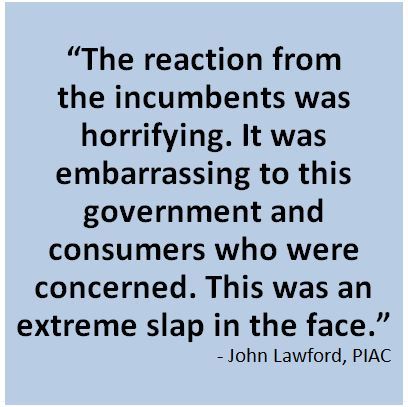
OTTAWA – The federal government’s vague plans for lower wireless prices, and pick and pay TV channel packaging seem to be ploys to curry consumer favour and not in the public interests, overall, argued members of a panel at the International Institute of Communications Canada’s annual conference in Ottawa on Tuesday.
Rather, the federal Conservatives are focused on scoring political points and on short-term outcomes without considering the potential long-term ramifications of their actions on the broader Canadian public.
Richard French, a professor in international and public affairs at the University of Ottawa and former vice-chair of telecommunications at the CRTC, noted that there is nothing wrong with the federal government acting to defend consumer interests, but added that there needs to be sound analysis to support the reasons for intervening on behalf of consumer welfare.
“When you do that you want to have a set of guiding principles or some type of an economic analysis which underlies and supports the sensibleness, the intention of the policy so that you are simply not improvising,” he said.
French said the Conservative government is taking its consumer agenda to a new level though, particularly with respect to wireless services.
The ad campaigns of the summer of 2013 (illustrated during the panel by these two clips) “marks a spectacular departure from the social contract that has governed government-business relations in Canada. It’s the most extreme example I’ve ever seen of an essentially political argument being made with taxpayers dollars,” he argued in reaction to one of the government’s ads promoting its wireless plans.
The former chief of the Competition Bureau of Canada also weighed into the debate about whether the current government’s stance on wireless is in the public interest. Lawson Hunter, counsel at Stikeman Elliot and a former senior executive at Bell Canada, noted that while the federal government insists it’s only acting to benefit consumers with more choice and lower wireless prices, it hasn’t done a full evaluation of how it can do a better job than allowing the free market to sort things out.
“What do we mean when we say more competition? How much is enough?” he asked. “On lower prices, how do you determine what those lower prices should be?”
During is short opening remarks, he argued that governments should only intervene in cases of market failure whether that be from natural monopolies, as was the case in telecom days of the past, or where competition is ineffective. Hunter added that free markets will produce lower prices, better quality and more choice.
The impact of the government’s supposed consumer interest policies extends beyond the wireless sector and could have some dramatic impacts on the broadcasting sector. Pick and pay, or a la carte channel packaging is also in the Conservatives’ cross hairs.
Andrée Nöel, former commissioner at the CRTC and current head of the Canadian Broadcast Standards Council, worries that the move away from public interest to a consumers-first policy will have lasting negative impacts on the broadcasting system. She argued that the government needs to consider whether short-term benefits of unbundling channel packaging outweigh the potential long-term negative impacts on then entire broadcasting system.
“If we were in a complete pick and pay model, what would that bring? Would we still have a basic tier for basic television programming? Will French stations be picked up west of Ottawa? What about channels distributed under section 91h?” Noel asked. “Chances are with a complete pick and pay scenario, sports and sex channels will become the norm.”
John Lawford, executive director and general counsel at the Public Interest Advocacy Centre, said the Canadian wireless carriers are getting what they deserve from the feds and consumer sentiment. When the federal government took steps to try and improve the situation for wireless consumers, the carriers fought back with attack ads that essentially said they were the only ones who could deliver for consumers.
“The reaction from the incumbents was horrifying. It was embarrassing to this government and consumers who were concerned. This was an extreme slap in the face,” he said. The problem, added Lawford, is there has been a lack of consumer policy development in Canada.
“The fact is there has been no consumer policy development, no public policy development in this country at all coming from this government. There’s no money for this. We’ve been starved to death and you get what you get. If somebody wants to put money into this to have this conversation, I can’t wait,” he said.
Bryan Tramont, managing partner, managing partner at US law firm Wilkinson Barker Knauer LLP, and former FCC chief of staff noted that this issue is not unique to Canada, and the U.S. has also experienced similar problems. He said that various American administrations have looked for that next competitor, a concept he described as “the shiny object problem.” It’s a constant pressure, Tramont added.
French argued that it’s hard to say that this government is acting in the best interest of wireless consumers when considering how it has acted over the past five years. First, the Conservatives set aside spectrum for new entrants, but limited their ability to sell their licences in the first five years to non-incumbent carriers. When faced with a new entrant wanting to exit the market now, the government then changed its mind and said the spectrum can’t be sold to an incumbent even after the five-year restriction expires.
He wondered how this type of approach to wireless can be in the consumer interest when “no one in their right mind will invest in an entrant in the current environment because the entrants are not allowed to dispose their assets as they were promised they would be able to.”